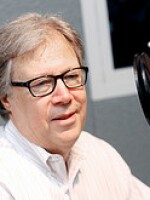The producer helped shape four young rock 'n' rollers into a revolution.
On a hot August afternoon in 1966, I was driving down a residential street in my hometown of Niskayuna, New York.
I was driving a demure little Ford Falcon that belonged to the mother of one of my high school friends. I had borrowed the car to run an errand and I was late getting it back, so I was, to the extent possible in a Falcon, speeding.
With no announcement, a song I had never heard before came on over the crummy AM radio:
“Ah,” it began out of nowhere, “look at all the lonely people…”
I instantly recognized that it was the Beatles, of course. Late as I was, I had to pull over and listen all the way through. Funny how, half a century later, the memory is so vivid.
Weirdly, as striking and original as the song was in its entirety, the thing that impressed me most was the very last note, played by the string octet that accompanies the tune.
That last note was neither a conventional staccato “button,” nor a classic, sustained final chord, either of which would have been standard practice. Instead, it was an ambiguous in-between note. It sounded, and still sounds to me today, like a note interrupted somehow, like the interrupted life of the lonely woman of the title, to whose funeral nobody came.
Martin was, from the beginning, an essential and indispensable component of the Beatle magic.
I’m thinking these thoughts because the man who wrote that string octet part, including its tantalizing last note, has died at age 90.
George Martin is a name that all of us who lived through the rise of the Beatles came to know only gradually. At that time, the notion of a record “producer” didn’t mean much to most listeners. The guy who fiddled with the control room levers and dials, perhaps. Or possibly the person who hired the sidemen and the professional arrangers.
Little by little, as the Beatles knocked down one stylistic door after another, and began to be spoken of seriously by critics and musicologists, Martin increasingly became part of the conversation.
We eventually came to understand that this man -- a jacket-and-tie wearing, classically trained oboist and pianist, who had been best known in his industry for having put out some cultish British comedy albums -- was, from the beginning, an essential and indispensable component of the Beatle magic.
Over the years, there has been a lot of speculation about what would have happened had the Beatles -- in 1962, still complete unknowns and already rejected by dozens of labels -- not washed up on the doorstep of Parlophone Records, and into the hands of a junior producer whose initial response was, at best, skeptical.
Would we have ever heard the mind-blowing backwards tape loop at the end of “Rain”? Or the crisply speeded-up Baroque piano solo on “In My Life”? Or the jaunty piccolo trumpet on “Penny Lane,” or the electronic chorus on “Tomorrow Never Knows,” or the subtly jazzy sax ensemble on “Lady Madonna” or the brilliantly stitched-together alternate takes to form “Strawberry Fields Forever,” or the deliciously Ives-like random steam organ snippets on “Mr. Kite,” or the apocalyptic, mellotron-infused soundworld of “I am the Walrus”?
If you’re tempted to say yes, pause and listen to Phil Spector’s gloppy, ruinous orchestrations on the “Let it Be” album. Now think about a similarly conventional hand presiding over “Revolver,” or “Rubber Soul,” or “Abbey Road.”
As Mark Lewisohn’s book “Tune In” (the first of a projected trilogy) makes clear, pretty much everything about the Beatles’ journey, and especially the early part of it, was serendipitous.
But nothing more so than their great good fortune in being paired with a modest, visionary man, almost old enough to be their father, who took the hummed and strummed musical ideas of four untrained young rock ‘n’ rollers and quietly shaped them -- sometimes with tape loops and sequencers and sometimes with manuscript paper and a pencil -- into a revolution.
Reach Steve Metcalf at spmetcalf55@gmail.com.





